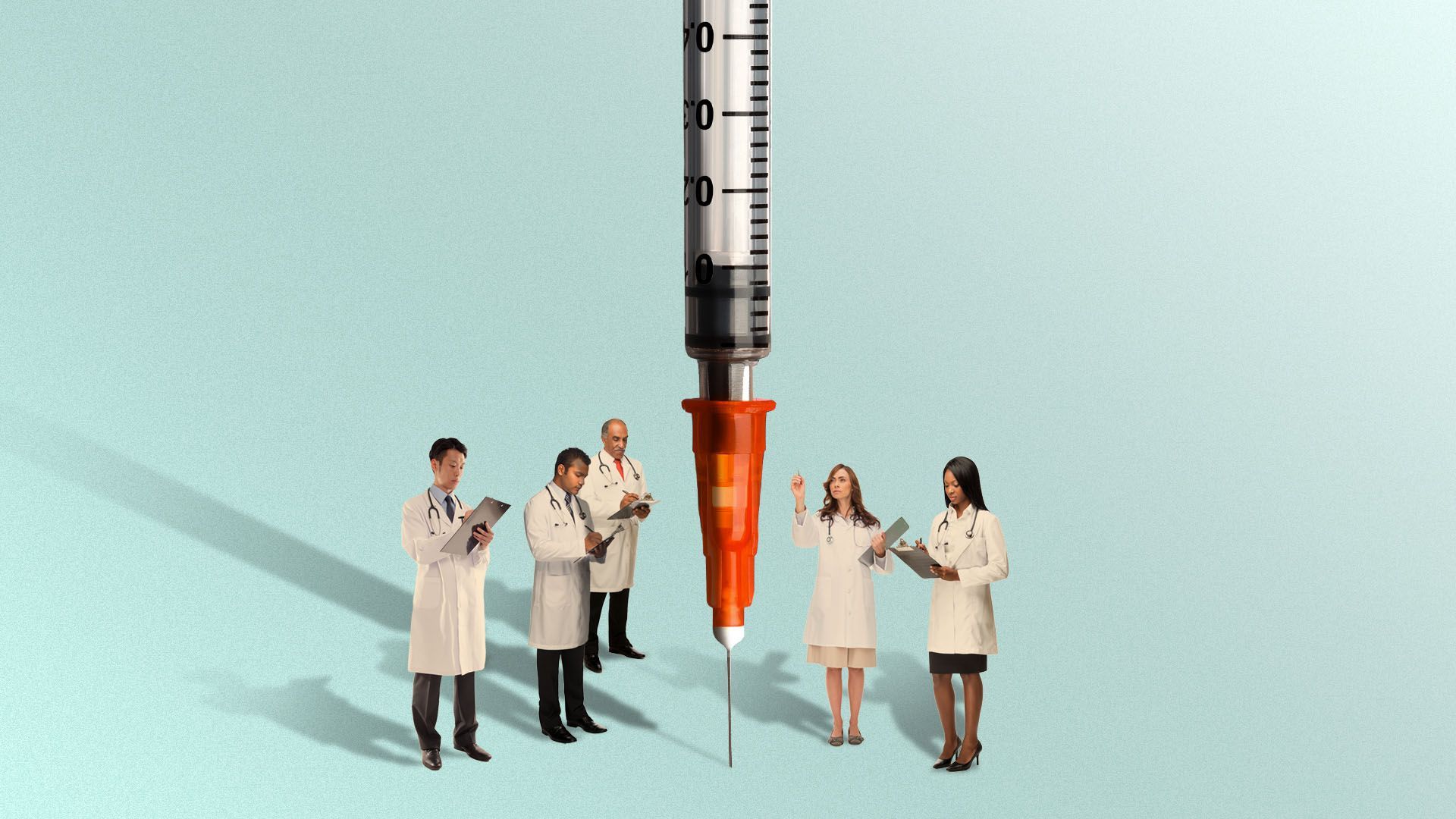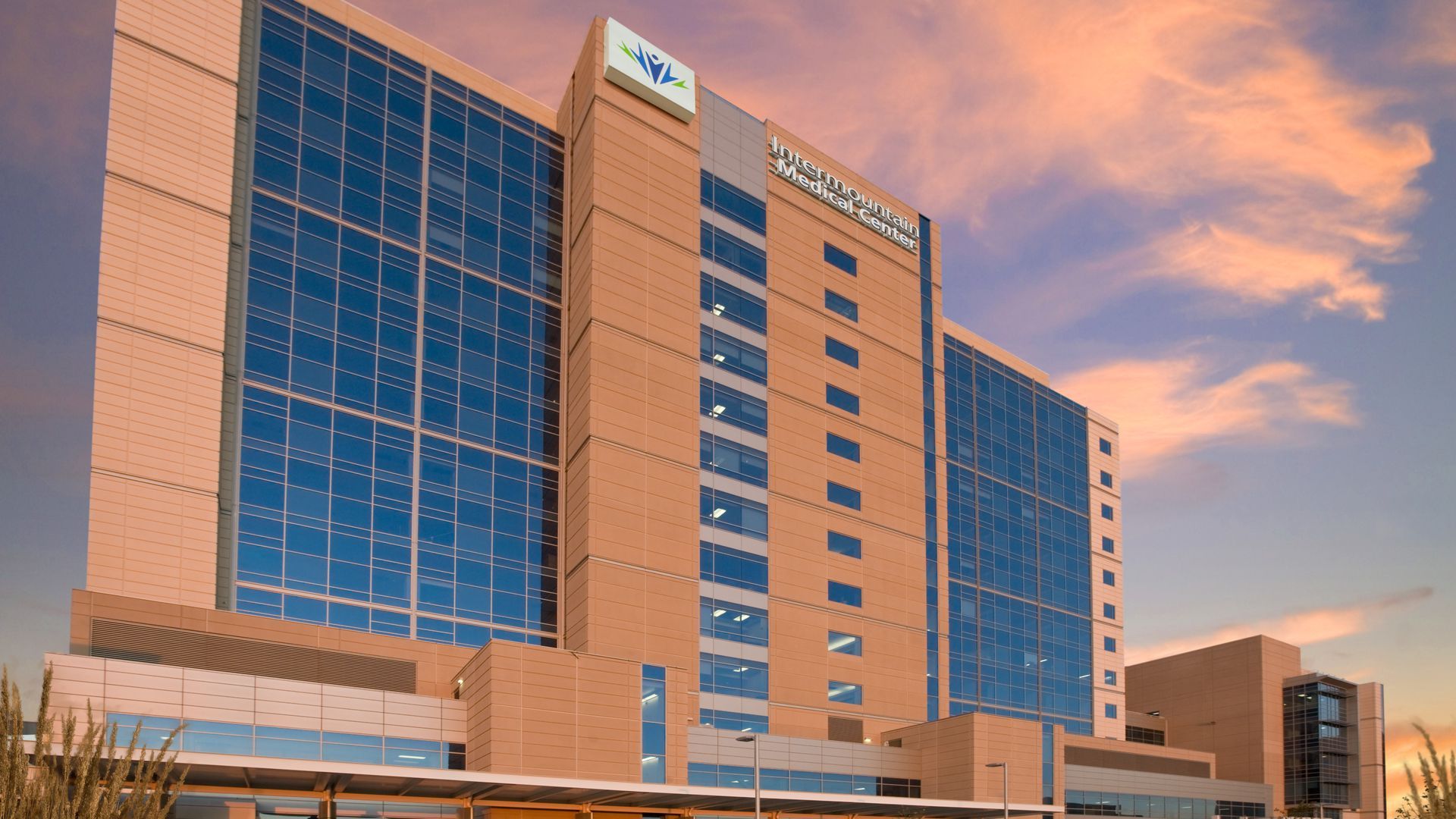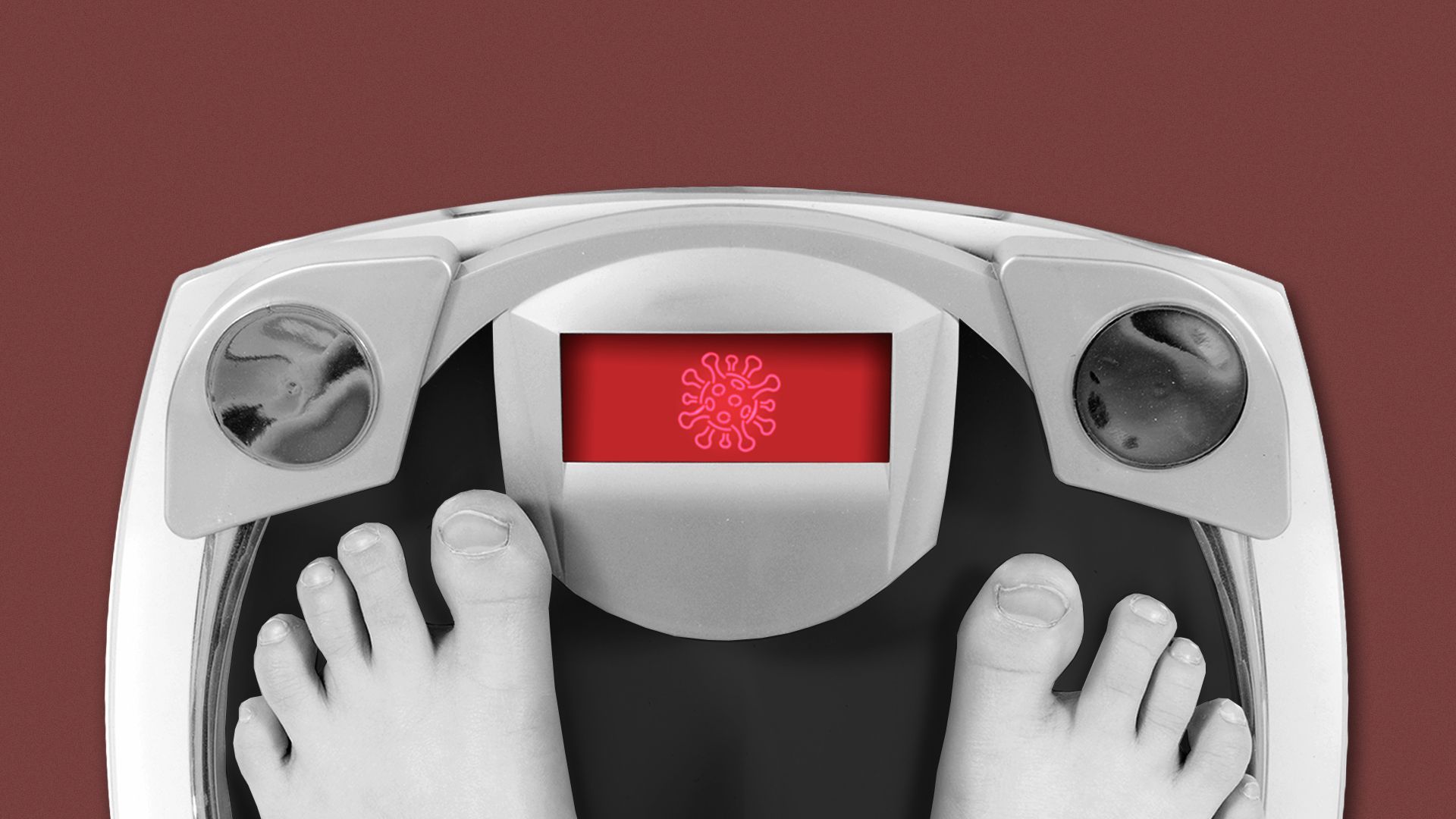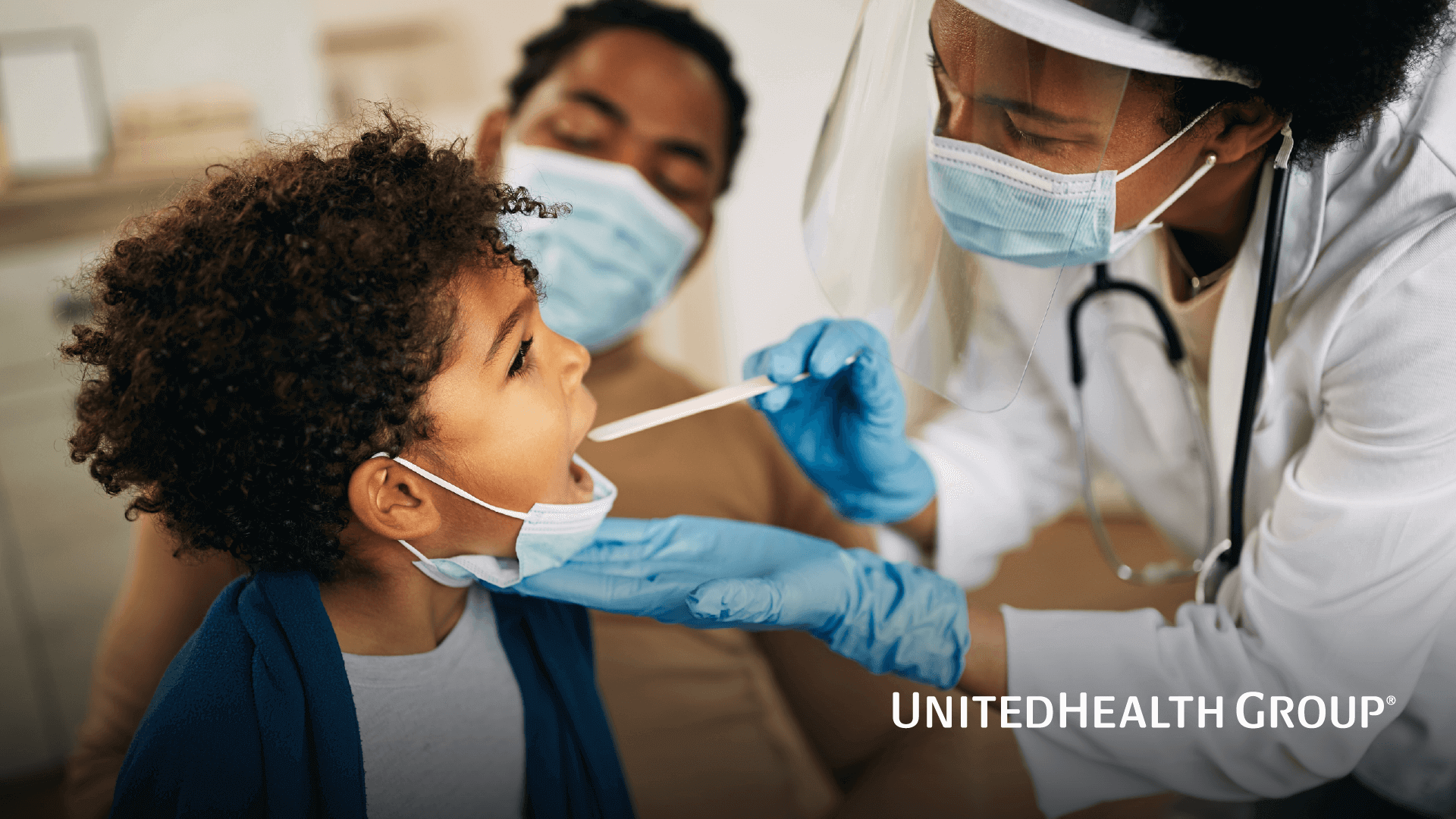| |
| |
| |
| Presented By UnitedHealth Group |
| |
| Axios Vitals |
| By Tina Reed ·Sep 17, 2021 |
| Happy Friday, Vitals readers. Today's newsletter is 831 words, a 3.5-minute read. |
| |
| |
| 1 big thing: 💉 The question of who should get boosters |
 |
|
| Illustration: Sarah Grillo/Axios |
| |
| A key FDA advisory committee is meeting today to discuss Pfizer's proposal for a COVID vaccine booster — but it will set the stage for the entire booster debate. The big question: Not only whether experts believe there's enough evidence to support boosters, but also whether they believe additional shots should be made available for everyone or limited to older Americans and the immunocompromised. Driving the news: Pfizer has proposed a booster dose about six months after the second shot, for people 16 and older. The FDA committee will consider whether the company's data support that approach. What they're saying: "It will be a real clear signal whether there's a rebuke of the White House's stated approach from last month, or whether it will move forward broadly in line with what they outlined back in August," Jason Schwartz, associate professor in the department of health policy and management at the Yale School of Public Health, told Axios. What to watch: Data published this week out of Israel offered a "compelling" case for a booster as vaccines' efficacy wanes, said Peter Hotez, dean of the National School of Tropical Medicine at Baylor College. - However, two of the FDA's top vaccine reviewers who announced plans to leave the agency signed onto a paper published in The Lancet this week that said booster doses are not necessary for the general public right now.
|
    |
| |
| |
| 2. Intermountain to acquire SCL Health |
 |
|
| Intermountain Healthcare has found a new merger partner. Photo: Intermountain |
| |
| Intermountain Healthcare will acquire SCL Health roughly six months after Intermountain and Sanford Health ended their merger attempt, Axios' Bob Herman reports. Why it matters: The combined Intermountain-SCL system would own 33 hospitals, will generate more than $13 billion of annual revenue and will dominate several areas throughout Utah and Colorado — gaining leverage over insurers and employers as a must-have network. By the numbers: Both tax-exempt systems posted high-end profit margins in 2020, which were buoyed in part by taxpayer bailouts to stem the initial impact of the coronavirus pandemic. What they're saying: The combined hospital system said it is committed to "transparency and affordability," but could not guarantee prices or employer premiums would stay flat or decrease. - However, Intermountain CEO Marc Harrison said: "Hold us accountable."
Read more. |
    |
| |
| |
| 3. Childhood obesity accelerated during the pandemic |
 |
|
| Illustration: Annelise Capossela/Axios |
| |
| Children and teens gained weight at an "alarming" rate during the pandemic, Axios' Marisa Fernandez writes from a new CDC report. Why it matters: The study, which analyzed more than 430,000 kids ages 2 to 19, validates experts' warnings that the closure of schools and child care settings may have reduced regular physical activity and access to healthy meals. By the numbers: The average body-mass index increase for children and teens approximately doubled between 2018 and 2020. About 22% of children and teens were obese last August, up from 19% a year prior. - Weight gain from children with moderate obesity increased from 6.5 pounds a year to 12 pounds after the pandemic began.
- For kids with severe obesity, the anticipated annual weight gain went from 8.8 pounds to 14.6 pounds.
Go deeper. |
    |
| |
| |
| A message from UnitedHealth Group |
| Advancing health equity by addressing social determinants of health |
| |
 |
| |
UnitedHealth Group is committed to addressing social barriers that influence disparities in health care access, outcomes and affordability. We have helped: - Create 12,000 homes by investing $550 million in affordable housing.
- Provide over 100 million meals during the pandemic.
Learn more. |
| |
| |
| 4. The future market for CRISPR |
 |
|
| Illustration: Aïda Amer/Axios |
| |
| The gene-editing tool CRISPR is moving toward the market, promising better tests and cures, Axios' Bryan Walsh writes. The big picture: CRISPR is already a historic scientific achievement, but we're just now entering the moment when it will begin to impact patients. Driving the news: The San Francisco-based CRISPR startup Mammoth Biosciences — whose co-founder, Jennifer Doudna, shared a Nobel Prize for chemistry last year — announced $195 million in funding late last week, valuing it at more than $1 billion. - Mammoth first focused on using the tool to develop diagnostic tests for diseases by programming CRISPR sequences to seek out a particular stretch of RNA or DNA in a virus.
- The relative ease of programming CRISPR opens up the possibility of cheap and accurate tests that could diagnose multiple pathogens simultaneously.
- That's one reason the company received funding from the Defense Department in January to develop a point-of-care test. Mammoth has also received funding from the NIH to scale up a disposable, handheld COVID-19 test.
The intrigue: Another new company, the startup Colossal, wants to use gene editing for an even more audacious goal: bringing back the woolly mammoth. Yes, the woolly mammoth. |
    |
| |
| |
| 5. Pic du jour |
 |
|
| Photo: Mandel Ngan/AFP via Getty Images |
| |
| White flags are seen on the National Mall in front of the Washington Monument in Washington, D.C., on Thursday. - The project, by artist Suzanne Brennan Firstenberg, uses over 600,00 miniature white flags to symbolize the lives lost to COVID-19 in the U.S.
|
    |
| |
| |
| A message from UnitedHealth Group |
| Expanding access to care in underserved communities |
| |
 |
| |
| UnitedHealth Group is helping to address social determinants of health for uninsured individuals and underserved communities. See how we're advancing health equity through community partnerships that have helped more than 6 million people access care, nutritious food and stable housing. |
| |
 | | It'll help you deliver employee communications more effectively. | | |










No comments:
Post a Comment